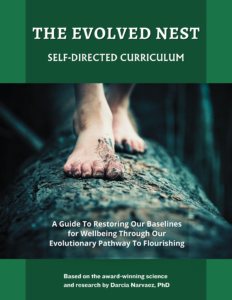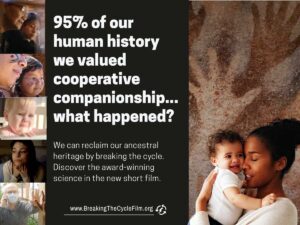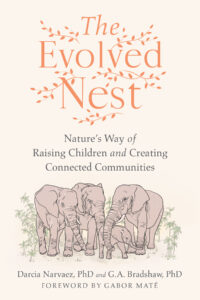We Got You! Community Engagement and Self-Study With The NEW Evolved Nest Curriculum!
We’ve been creating and compiling Evolved Nest educational resources for you for six years! And now you can find them in an interactive PDF, organized by the nine components of our evolved nest. The 58-page PDF includes links to the many self-nesting tools, baby care campaigns, Evolved Nest Explained videos, and hundreds of posts, research articles, and podcasts with Darcia Narvaez, ENI’s founder and Kindred World’s president We’re grateful for the team of reviewers that carefully and conscientiously gave us feedback about this material and its final form before sharing it with you. We will be updating this curriculum PDF with more resources, but you can find it here now on the front page of the Evolved Nest website.
Darcia Narvaez Introduces the Evolved Nest Self-Directed Curriculum
What is our Evolved Nest?
The evolved nest is the developmental system our species developed to optimize normal development. It is millions of years old. For young children, the evolved nest consists of soothing gestation and birth, on-request extensive breastfeeding and positive touch (no negative touch) and movement, a welcoming social climate, self-directed play with multiple aged mates, warmly responsive nurturing from mother and others, nature immersion and connection, and healing practices to repair miscommunication or hurts. For everyone beyond early childhood (beyond perinatal and feeding experiences), the nest components support health, wellbeing, sociality and compassionate morality. Well-nested children and adults demonstrate social and moral flexibility, adapting to situations and others with emotional and spiritual intelligence.
Why is the Evolved Nest important?

We all want to be healthy, and this begins with the evolved nest. The evolved nest represents the type of support babies, children, teens, and adults need to grow and maintain physical, mental, and social health. Nine components have been identified. Two components apply to infancy and early childhood, but the rest apply to every age group. In infancy we need soothing perinatal experiences and extensive on-request breastfeeding. But throughout life, we need the rest of the nest components to grow to our full potential. The evolved nest or evolved developmental niche is the ecological system of care provided by families, teachers and communities that aligns with the maturational schedule of the child, satiating the evolved needs of infants and children, allowing them to flourish and develop compassionate spiritualities. Yes, along with the evolved nest components we’ll discuss, children learn compassion from the ceremonies, stories and practices they observe and imitate. Children are biosocial creatures such that their biology is constructed by their social experience.
The evolved nest components support the development and maintenance of our humanity—our cooperation and wellbeing. We now know that early life experiences are vital for promoting lifetime health—physical, psychological, social, and moral.
Why should you know about the Evolved Nest?
There is a lot of misinformation about young children and their needs, and parents are often encouraged to ignore baby’s signals. Bad idea. Babies are “half-baked” at birth and have much to learn with the help of physical and emotional support from caregivers. Responding to baby’s needs is an investment that pays off with a happier, healthier, more cooperative child and adult.
Every community member, whether parent/grandparent or not, can be informed about child development and how best to meet children’s needs. Their understanding of children’s needs will be made apparent in their advocacy of policies and practices that support meeting the needs of children and families. The Evolved nestis fundamental to understanding what children need.
What facts should you know about the Evolved Nest today?

The baselines for normal childrearing have shifted in the USA. Many people seem confused about what children need and what appropriate childrearing is. With little attention to our deep history, it is easy to believe anything. Parenting seems more about how little of children’s needs can be provided to children and still have them reach adulthood intact.
Provisioning the evolved nest has deteriorated in the capitalist-industrialized world, so much so that human health and wellbeing around the world are deteriorating in turn. The USA exports its ways to the world, so attention to its wellbeing is worthwhile. The USA has been experiencing a decline in child and adult physical and mental wellbeing for some time. In a study published in 2013, everyone in the USA under age 50 at that time, regardless of background, was at a health disadvantage compared to other advanced nations (e.g., National Research Council, 2013).
Children’s health and wellbeing have been deteriorating (Organization Economic Cooperation and Development, 2009; United Nations Children’s Fund [UNICEF], 2007), young children’s aggression and psychotropic medication levels have been on the rise even before the pandemic (Gilliam, 2005; Powell, Fixen & Dunlop, 2003), and anxiety and depression are at epidemic levels for all age groups (e.g., United States Department of Health and Human Services, 1999).
The pandemic created even more distress and illbeing. Mental health has not improved. In 2023, the US Surgeon General put out a report on the epidemic of social isolation and loneliness.
International Comparisons. International comparisons are available for country wellbeing, but you must understand that world organizations tend to focus on economic wellbeing (e.g., income) and physical wellbeing (e.g., clean water) and not usually on social wellbeing (social capital, sense of belonging and mattering) or ecological wellbeing (the health of ecological systems, biodiversity, lack of pollution, etc.).
You can check for your country’s health status here:
- https://www.oecd.org/wise/better-life-initiative.htm
- https://globalwellnessinstitute.org/industry-research/happiness-wellbeing-index/
- https://www.ghsindex.org/ (global health security)
Now, watch the Breaking the Cycle Film.

WRITE down your reactions to the film or DISCUSS with the group.
- What stood out for you?
- What experiences of cooperative companionship have you had? What experiences of competitive detachment have you had? Which do you prefer? Why?
- Think about and write down why you want to learn more about the evolved nest. What brings you to the curriculum? Perhaps it is valuing children or the wellbeing of your community. Perhaps you want to understand yourself. Perhaps you are just curious and want to know more. You can discuss your motivations in your journal or with your group.
What to do now? Learn more:
- Read: “Wellness-Informed” Versus “Trauma-Informed” Foundations For Practice
- Read: How Modern Societies Violate Human Development
- Read: What does “spoiling a baby” mean?
- Read: Babies are Not Machines
- Read: Baselines For Babies – The Best Parenting Style For…
- Read: Baby Care: Baselines For Mental Health
- Read: Baby Care: Baby Care: 3 Rs for Raising a Happy Child
- Read: Be Worried About Boys, Especially Baby Boys
Application
It might be that you had little or none of the evolved nest. This may trouble you as you learn more about why each component is important. The attitude we recommend is to understand that humanity is relearning many things it has forgotten in recent centuries when machine thinking took over the dominant culture and natural processes were disparaged. This means we can take in the new information and pledge to change our ways going forward, forgiving ourselves or our parents and families for their lack of knowledge and knowhow.
If you have any questions, please email EvolvedNestInitiative@gmail.com


